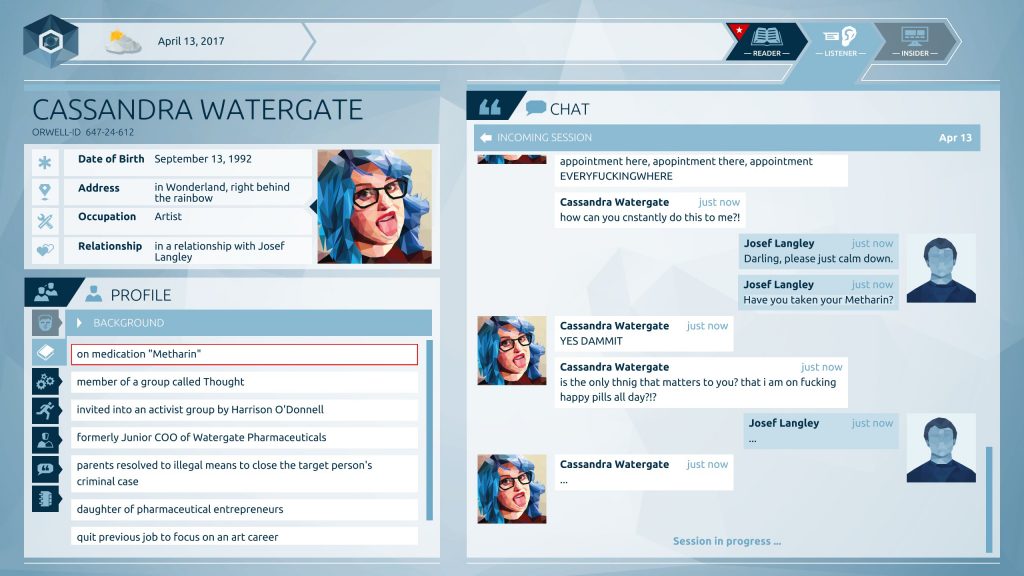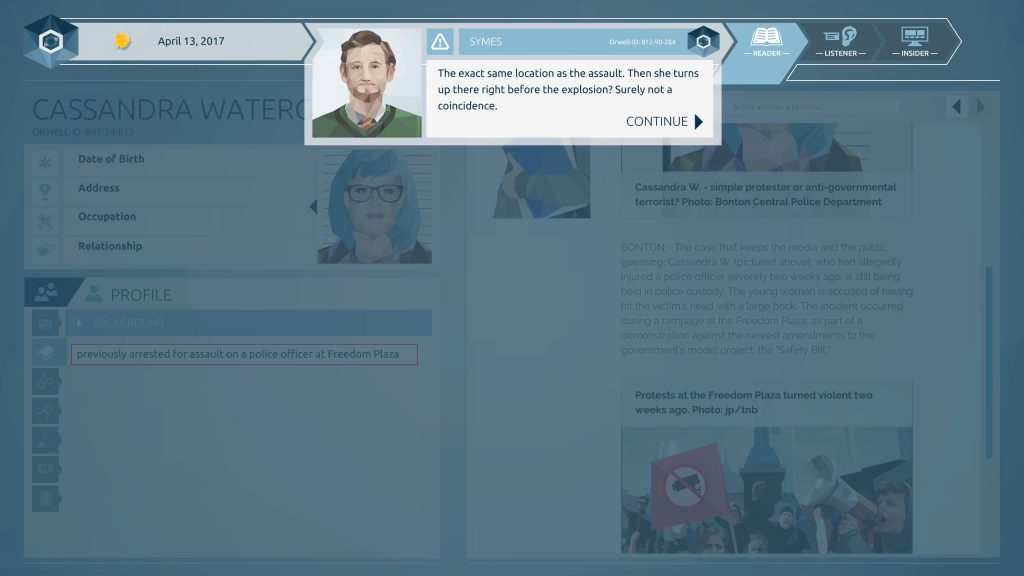What if there was a tool the government could use to collate data from your social media profiles, dating sites, blog posts and smartphones, building a profile that links together indicators of dangerous personalities with current events? Well, I left my tinfoil hat at home today, and frankly I think it would be naive to assume such software doesn’t already exist in some capacity, but what would it be like to be the person making the calls? Deciding what fragments of your life are relevant, what makes you dangerous, how they can link you to terrible crimes? After four hours playing Orwell, I can tell you – bloody difficult.
As a series of bombings take place, you must find the culprit, vigilantly examining existing police records and web presences, snooping into text messages and private phonecalls to find precious information and build detailed profiles of an expanding web of suspects. Ranting on Twitter about how much you hate the government is not always the crystal clear admission of guilt that you need – though as Orwell shows, it’s not so much the truth that matters, but how the information can be twisted to suit your needs. It all takes place in a fictional country simply referred to as The Nation, which is an intentionally vague amalgamation of your typical Western societies with clear parallels to real events and concerns. It’s as simple as clicking and dragging snippets of information from webpages to the profiling program, but it’s not all vital, in fact, quite a lot of the details are completely unessential or contradictory, making you wonder just how effective the Orwell software would be at finding “real” truth. As you glimpse into the public and private lives of a handful of suspects, their conversations and posts on the web will inevitably colour your perception of them, making it easier to string together previously unrelated information to justify their arrest.

A web of suspects and related people of interest forms as you monitor chats and media pages, and considering these people are never more than a few statistics and letters on a monitor, they’re surprisingly complex.
Are you really out for justice, or are you just trying to pin the bombings on the most convenient suspect? With that in mind, does mere suspicion warrant complete and total invasion of someone’s deepest, darkest personal secrets? You’ll often delve into extraneous information as you piece together the big mystery, but rather than illuminating motivations or methods, it’s just… sad, and likely to prejudice your decision one way or the other, which of course is a massive flaw in the process and no doubt a big part of what Orwell is highlighting. For example, one of your potential bombers is a veteran single mother doing everything she can to support her son, and while she initially appears aggressive and suspicious, she’s also suffering from PTSD, and it feels like the simple act of putting her under such an invasive microscope is making her into the monster you think she is. Moving away from moralistic commentary, the game also deserves major credit for storytelling and character building. You will see your suspects at their best and worst, audio cues underscoring dramatic revelations and inevitable tragedies associated with the information you collect. Between your surveillance duties you can read news headlines which give everything a bit more context and explain just why the Orwell software is legal in the first place. For a game set in a country simply referred to as The Nation, governed by The Party, it’s full of complexity.

Those of you who love getting your detective on will appreciate how much of the decision making is left to you. As an investigator, you are the only one who can view all of the accessed information. By picking out chunks of data you’ll upload them to a mainframe which your handler will use to make arrests and authorise new individuals to profile, allowing you to build a picture of guilt from a ton of information. You get complete, unbridled access into these people’s lives, and the parts you choose to process and ignore will have drastic consequences, often in ways you can’t foresee. It’s amazing how well Orwell tells its story with such a simple interface – themes of terrorism and government surveillance are rarely captured so elegantly. Through news articles, monitored phone calls, and government websites a wonderfully deep world is made, full of intrigue and conflicting beliefs. It does all this unburdened by the delivery of one particular message, indeed, most people will take away their own opinions after solving the case. It’s left me with a conflict of my own – sure, by prodding into people’s privacy, I saved lives, but I did so by taking things out of context to support my own beliefs, and spying on a lot of ultimately innocent people.
What is truth? Is it fact, or is it what we want to believe in order to justify our decisions? Orwell asks this question, and despite four hours of digital crime-solving and sanctioned snooping, I still don’t have an answer.
THE TL;DR:
- Become Big Brother – safeguard a conflicted Nation from inner threats by keeping tabs on a complex and volatile group of individuals.
- Simple in its presentation, and puts across several difficult themes with apparent ease, never preaching one way or the other.
- Will definitely make you consider your internet presence a bit – displays how easy it is to take innocent moments of rage out of context.
- Representative of a future many of us are staring down the barrel of, an easily relatable story told well and an enjoyable bit of detective work too.